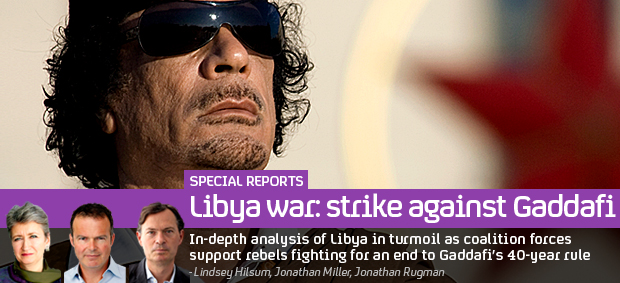UK Apache helicopters launch raids in Libya
British and French helicopter gunships have attacked Colonel Gaddafi’s forces, amid criticisms that the scale of NATO’s involvement is suffering from “mission creep”.
The Ministry of Defence confirms that RAF Apaches launched from HMS Ocean attacked and destroyed two targets near the town of Brega.
The attack helicopters used rockets to destroy radar stations and checkpoints held by forces loyal to Colonel Gaddafi.
A spokesman for the MoD said: “UK Apache Attack Helicopters have taken part in coordinated operations over Libya as part of NATO’s Operation Unified Protector to protect civilians under United Nations Security Resolution (UNSR) 1973.
“All of the aircraft recovered safely to HMS Ocean.”
French Gazelle helicopters also took part and launched other attacks in the same operation.
The helicopters are reported to have come under fire during the raids, but destroyed the vehicle attacking them. The former head of the Army, General Lord Dannatt, said: “These things are highly sophisticated and those on the ground should not tangle with them.”
NATO’s decision to utilise helicopters will give military commanders the ability to strike targets at close-quarters and avoid civilian casualities. It is expected they will be deployed around built-up areas in particular.
During the siege of Misrata, Gaddafi’s forces placed tanks and soldiers in dense urban areas to protect them from NATO air strikes.
Defence analyst Dr Kenneth Freeman has told Channel 4 News that each Apache can cost up to £10m a year to operate – and once an aircraft is deployed into the conflict zone the costs will soar.
Mr Freeman said: “First of all, at war they are worked a lot harder. Secondly they attract metal; and they require repairs, fuel, and a base – so you’ve got the cost of a ship or on the ground support.”
The British government bought 67 Apaches in 2006 for approximately £37m each.
Each helicopter carries a mix of weapons including rockets, Hellfire missiles and a 30mm chain gun. They also have thermal imaging capabilities.
NATO chiefs have applauded this first strike with the gunships praising their tactical abilities to strike targets that previously alluded conventional fighter jets.
“This successful engagement demonstrates the unique capabilities brought to bear by attack helicopters,” said operation commander Lieutenant-General Charles Bouchard.
“We will continue to use these assets whenever and wherever needed, using the same precision as we do in all of our missions.”
Earlier this week, Defence Secretary Liam Fox acknowledged the “increased risk” attack helicopters face, and some MPs warned this move was an escalation of the conflict.
Labour MP Graham Allen, who opposed the UK’s involvement, criticised the “mission creep” and called for a fresh Commons debate and vote.
“The way out of this mess is not to keep cranking up the military hardware and having so-called ‘implied tasks’ added on against the express view of the House of Commons.
“What we need to do is figure out how we can get a political solution that will last for several generations in Libya rather than this adventure which has no prospect of coming to a close.”
NATO launched its first air strikes on March 19 to protect civilians from the advance of Gaddafi’s forces on the rebel-held town of Benghazi.
